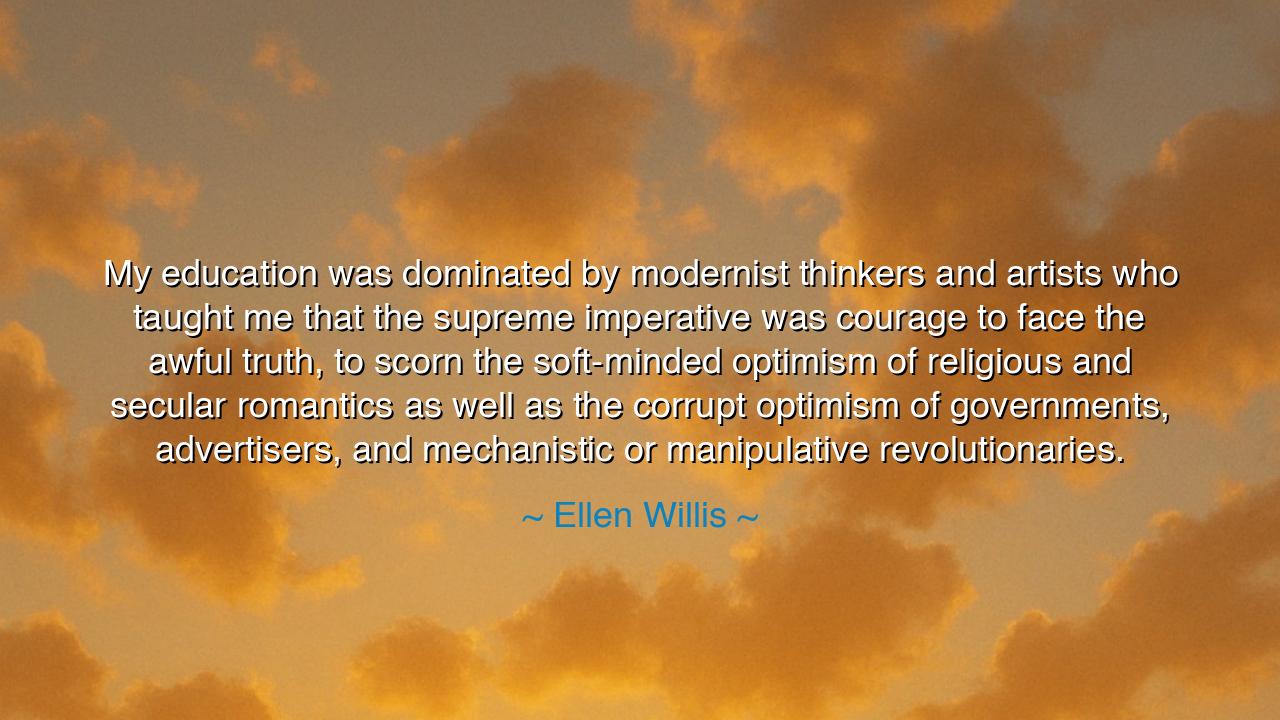
My education was dominated by modernist thinkers and artists who
My education was dominated by modernist thinkers and artists who taught me that the supreme imperative was courage to face the awful truth, to scorn the soft-minded optimism of religious and secular romantics as well as the corrupt optimism of governments, advertisers, and mechanistic or manipulative revolutionaries.






“My education was dominated by modernist thinkers and artists who taught me that the supreme imperative was courage to face the awful truth, to scorn the soft-minded optimism of religious and secular romantics as well as the corrupt optimism of governments, advertisers, and mechanistic or manipulative revolutionaries.” — so spoke Ellen Willis, a fierce voice of her age, a seeker of truth amid the glittering illusions of progress. Her words are a summons to courage, that ancient virtue which stands unbending before the storms of deceit. For what she reveals is not merely the story of her learning, but the story of every soul who has ever awakened from comfortable dreams to the raw, bracing air of reality. She calls us to cast away false consolations and to look directly into the heart of the world—unflinching, unblinded, and unafraid.
In the age of modernism, when old gods were questioned and new ones built from steel and reason, thinkers sought to strip away the comforting myths that had long lulled humankind into complacency. They believed that to live truthfully, one must endure the terror of clarity—to see the “awful truth,” as Willis calls it: that the world is not always kind, that justice is not guaranteed, that meaning must be wrested from the void by the strength of one’s own mind and spirit. These were the lessons of the poets, painters, and philosophers who shaped her: the modernists who shattered illusion not for destruction’s sake, but to find something real beneath the rubble of false hope.
Yet Willis warns that truth has enemies more subtle than lies. There is the soft-minded optimism—the kind that blinds itself with dreams of perfection, that denies suffering in the name of comfort, that replaces vision with fantasy. Whether dressed in religion’s robes or in secular rhetoric, this optimism numbs the heart to reality. It whispers, “All is well,” even as injustice festers. It clings to sentiment when the times demand courage. Willis, trained by those who faced the darkness head-on, urges us to reject this narcotic sweetness and instead embrace the bitter taste of honesty—for only by seeing clearly can we act justly.
But she also condemns another kind of false light—the corrupt optimism of power. Governments that promise peace while building war. Advertisers who sell joy while breeding emptiness. Revolutionaries who speak of liberation but seek control. In every age, these voices offer comfort wrapped in manipulation, progress disguised as control. To scorn such deceit, as Willis insists, is an act of moral bravery. It is to say: I will not be lulled by slogans, nor seduced by the glitter of false dawns. I will face the truth of my time, however bleak, and carve from it a path toward something genuine.
Consider the story of George Orwell, who in his time stood against the twin tyrannies of fascism and totalitarian communism. He, too, had been seduced once by grand ideals, but through the fires of war and exile he came to see how easily optimism becomes corruption when power speaks in the language of dreams. His writings, like Willis’s reflections, stand as monuments to the courage of the disillusioned—the ones who refuse both despair and delusion, and who choose instead the sharp, cold clarity of truth. From their struggle comes not hopelessness, but a deeper, more enduring hope: the kind that grows only from reality faced without fear.
And so, what Willis learned from her modernist teachers is not cynicism, but integrity. For courage is not the denial of beauty—it is the refusal to invent beauty where none exists. It is to walk through the desolate landscapes of truth and still keep one’s humanity intact. It is to see the emptiness of propaganda, the futility of hollow faith, and yet continue to create, to think, to love, and to build. The ancients would have called this the virtue of the stoic and the sage—the serenity that comes not from ignorance, but from wisdom hard-won through suffering.
Therefore, let the listener remember this: do not fear truth, no matter how terrible it seems. Do not cling to the illusions of comfort or the empty promises of power. Instead, cultivate within yourself the courage to face the awful truth—and the grace to act upon it. Seek not easy hope, but honest understanding. Build a heart strong enough to bear the weight of reality, yet tender enough to bring compassion into it. For in that balance lies the noblest form of faith—the faith that even when the world is cruel, the human spirit need not be.
And in this way, as Ellen Willis teaches, we become not dreamers of false light, but bearers of true fire. We learn that courage, not comfort, is the soul’s highest calling; that truth, not optimism, is the root of all genuine hope. And from that union of clarity and compassion, a greater strength arises—the kind that rebuilds civilizations, rekindles art, and keeps alive the eternal promise of humanity’s awakening.






AAdministratorAdministrator
Welcome, honored guests. Please leave a comment, we will respond soon